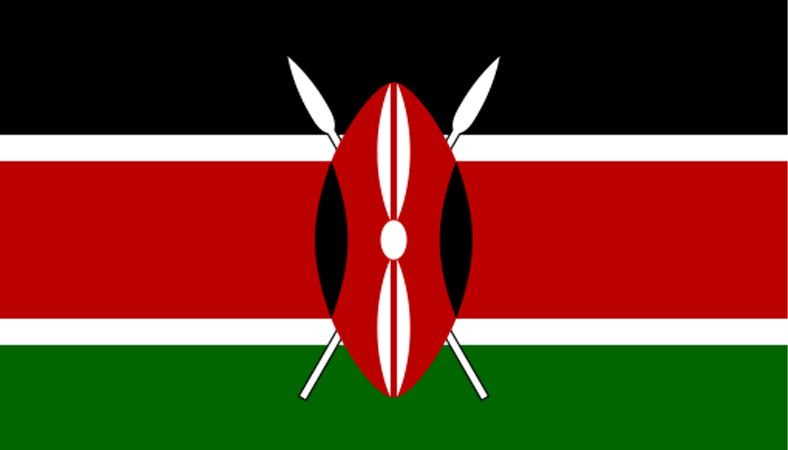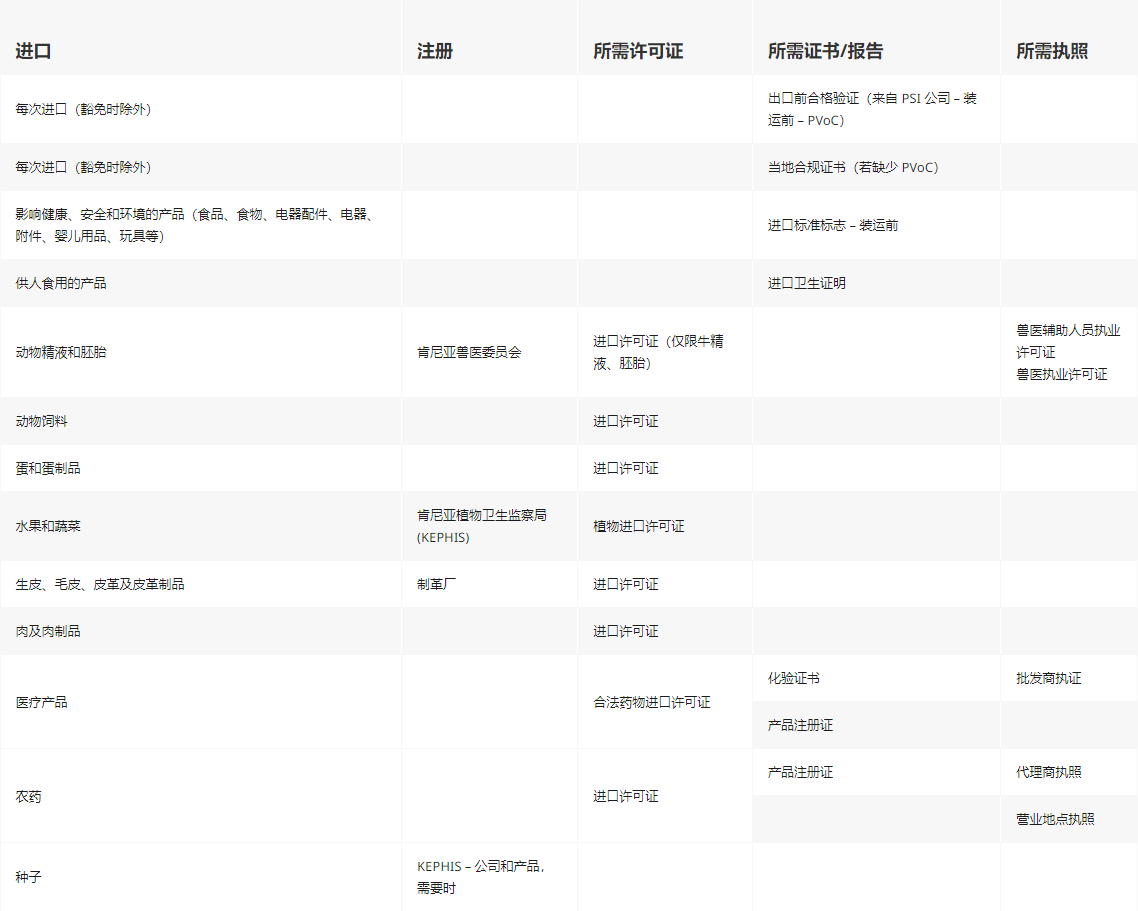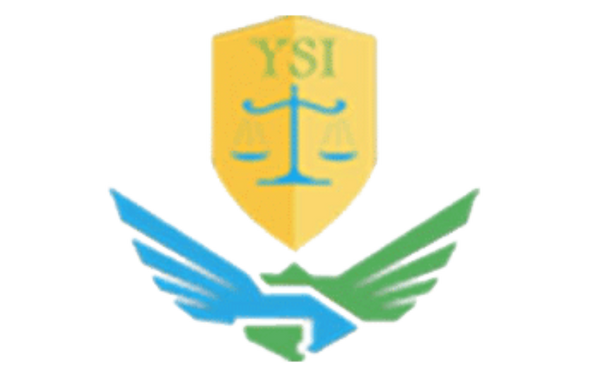
Kenya PVOC certification
Customs clearance | Export to Kenya - Pre-export Conformity Assessment Scheme PVOC Certification | Customs clearance for export to Kenya must comply with the Kenya Bureau of Standards (KEBS) (https://www.kebs.org/) Pre-export Conformity Assessment (PVoC) to ensure product quality, and the products must also meet Kenyan health, safety and environmental standards.

Kenya Customs Clearance Related Terms and Definitions
PVOC - Pre-Export Verification of Conformity
COC - Certificate of Conformity
COI - Certificate of Inspection
COR - Certificate of Airworthiness
NCR-Non-Conformance Report
RFC - Application for Certification
IDF-Import Declaration Form
QMS-Quality Management System
PVOC Partner - KEBS appointed inspection and certification company.
PPB - Drugs and Poisons Board (PCPB - Pest Control Products Board)
CA - Communications Authority of Kenya
KCAA - Kenya Civil Aviation Authority
DVS - Department of Veterinary Services
KEPHIS - Kenya Plant Health Inspection Service
Mobile Equipment – refers to used trailers, bulldozers, farm tractors, excavators, graders, mobile cranes and off-road vehicles

Kenya Import Requirements and Documentation
Kenya customs clearance PVOC certification required information
1. Packing list
2. Invoice
3. IDF: Import license, which is obtained by the importer in the importing country and then provided to the exporter for PVOC
4. Product test report
5. PVOC Application Form
6. Product description and usage description
Kenya customs clearance supplementary information
In addition to the above necessary basic documents, products exported to Kenya also require additional documents/requirements before the goods can be released.

Kenya PVOC certification process
- The exporter submits the Import Declaration Form (IDF), the invoice and the fully filled Request for Certificate Form (RFC);
- The above application form should describe the product in detail and provide product quality documents such as test reports, technical parameters, quality management system certificate (if any), etc.
- Determine feasible implementation plans and applicable standards under the plan;
- If testing is required, sampling and testing must be carried out by a laboratory approved by PVOC;
- On-site inspection will be carried out by the inspection company closest to the inspection location after completing the above steps, and all costs will be borne by the exporter;
- After the inspection is completed, the exporter submits the final documents (invoice and packing list) to the PVOC office;
- The Kenya PVOC Office issues a customs clearance certificate COC (registration certificate and form approval certificate).
Three forms of PVOC certification in Kenya
ROUTE A: Customs clearance certificate (COC) and inspection certificate for each batch (most of the goods are currently shipped in this way)
1. Application: The exporter contacts the PVOC office in the country where it is located and submits a completed application for certification (RFC) and the invoice of the batch of goods, or the Kenyan importer submits an import declaration form (IDF) and a copy of the invoice to start the PVOC process.
2. Testing/Inspection: The PVOC office inspects the goods to confirm whether they meet the requirements of Kenyan standards/technical specifications, and takes samples for testing. If the test results are qualified, a COC certificate will be issued based on the final invoice of the goods provided by the importer (for air transport, the certificate is allowed to be issued based on the invoice)
3. Certificate validity period: COC certificate is valid for 90 days and is only valid for the batch of goods. Food, medicine and chemicals can only use method a)
4. Issuance time: generally 5-10 working days after receiving the application materials and test report, excluding laboratory testing time. The testing time is determined by the commissioned laboratory.
ROUTE B: Product registration certificate + COC certificate for each batch of goods (if the same product is exported to Kenya multiple times, it is recommended to use method b)
1. Testing/application: Exporters apply to the PVOC Registration, Licensing/Certification Center, submitting a self-declaration that the product complies with Kenyan standards/technical specifications or international standards, as well as technical support documents such as product test reports and ISO9000 certificates issued by laboratories accredited in accordance with ISO/IEC standards. The PVOC Registration, Licensing/Certification Center reviews the documents submitted by the exporter and requires rectification if any problems are found. After confirming that the product meets the requirements, the PVOC Center will issue a product registration certificate.
2. Inspection and certification: When shipping, the exporter should submit a copy of the product registration certificate, the certification application form and the invoice of the goods to the PVOC office. The PVOC office will also inspect the goods, but only conduct sampling tests on individual batches. The exporter also needs to provide the final invoice of the goods. The PVOC office will issue the COC certificate after reviewing various documents.
3. Certificate validity period: The product registration certificate is valid for 1 year, and the product must continue to meet the registration requirements. If the product is modified, the modified product must also be modified accordingly.
ROUTE C: Product Type Approval (for manufacturers only)
1. If the product quality is stable after registration and continues to meet the compliance requirements for a long time, you can apply for a license from the PVOC Registration, Licensing/Certification Center. The PVOC Center will review the product test report and conduct additional tests if necessary. In addition, the factory's production facilities will be inspected. After the review of the above steps, the manufacturer will obtain a license for this type of product. In the future, when the product is exported, the manufacturer only needs to provide a certification application (RFC), a final invoice and a copy of the license, and the PVOC office can issue a certificate without the need for each inspection and product testing.
2. To monitor product compliance, the PVOC Office reserves the right to sample licensed products, but will notify the exporter in advance. If the product continues to meet the requirements, the license can be renewed annually, and the factory's production facilities will be supervised and inspected during the renewal. If the product is modified, re-registration must be applied for.
Kenya PVOC certification fee standard reference
1. PVOC certification fees: verification documents, physical inspection and container sampling fees
Route A: 0.60% of the FOB value of the goods, minimum USD 265, maximum USD 2,700
Route B: 0.55% of the FOB value of the goods, minimum USD 265, maximum USD 2,700
Route C: 0.35% of the FOB value of the goods, minimum USD 265, maximum USD 2,700
2. Other fees: laboratory testing, registration fees, bulk sampling fees, and secondary inspection fees will be charged directly by the agent based on specific circumstances.
FAQs on PVOC certification for customs clearance of exports to Kenya
1. How long is the validity period of the test report?
(1) Products such as disposable medical products, dry batteries, stationery, cosmetics, disposable sanitary products, fertilizers, textiles, tiles and PVC floors must provide recent test reports (within 3 months). The validity period of test reports for other products can be extended to one year;
(2) Electrical products must provide a CE certificate or a safety performance test report;
(3) For products that fall under the category of legal inspection, a copy of the certificate renewal voucher or release form issued by CIQ, test reports, health certificates and other information must be provided; please note that the shelf life after port entry must be within 75%. If these documents cannot be provided, sampling and testing must be arranged at the applicant's expense.
2. Can Kenya PVOC certification be applied for in series?
Yes, if the model is included in the test report, when applying for PVOC certification, it is also based on the test report.
3. Can different products apply for the same PVOC certification?
Yes, different customs codes (i.e. different products but from the same manufacturer) can be applied for one PVOC certificate, so you only need to look at the total value of the goods, but different products require different test reports.
Share this product

Kenya PVOC certification
Customs clearance | Export to Kenya - Pre-export Conformity Assessment Scheme PVOC Certification | Customs clearance for export to Kenya must comply with the Kenya Bureau of Standards (KEBS) (https://www.kebs.org/) Pre-export Conformity Assessment (PVoC) to ensure product quality, and the products must also meet Kenyan health, safety and environmental standards.
